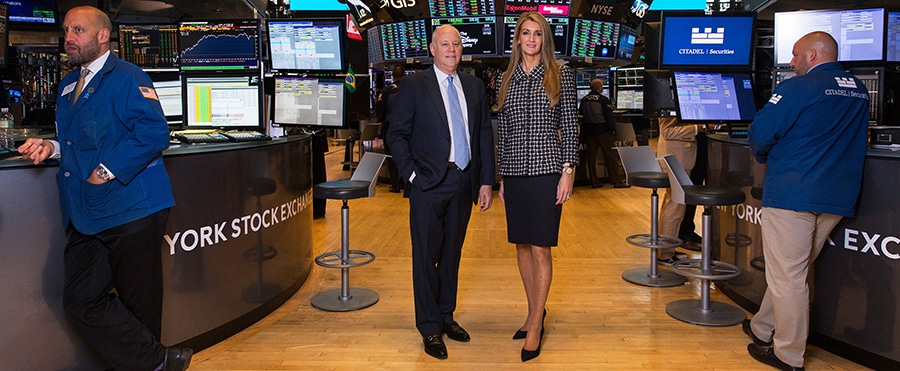Ever since the crytocurrency markets began falling at the beginning of this year, people have been saying that "institutional money" was coming.
They have been praying, hoping and wishing on a star that large financial institutions were about to jump into the cryptocurrency markets and stave off the losses.
While these prayers have landed on deaf ears for the past 8 months, things could be about to change with the entry of a company called "Bakkt". Yes, we have "institutional money" fatigue at the moment and some are immediately skeptical.
Hear us out though...
What is Bakkt?
Bakkt will be an open and completely regulated digital currency offering that will be powered by Microsoft Azure's cloud solution. This secure open source platform will connect a whole range of cryptocurrency users from investors to merchants and consumers. As stated in their original press release:
Bakkt is designed to serve as a scalable on-ramp for institutional, merchant and consumer participation in digital assets by promoting greater efficiency, security and utility
Bakkt is an initiative by the Intercontinental Exchange (ICE) which is a leading operator of global exchanges and clearing houses. This immediately adds a great deal of legitimacy to the new offering.
They also mentioned in the press release that they would be partnering with a number of other enterprises that will help them create this ecosystem. Apart from Microsoft, they have also partnered with Starbucks and BCG.
Yes, that is right, you could eventually buy your Starbucks Latte with cryptocurrency.
The ecosystem will also include a federally regulated market as well as warehousing options. This means that users of the Bakkt platform will have some form of government-regulated custodian service through Bakkt.
Bakkt is also jumping right into the Bitcoin futures market. However, unlike the current futures offering, these will be physically settled and not cash settled. The physical Bitcoin will be stored in their secure and insured warehousing solution.
Bakkt's technology has also been developed over a considerable period of time. According to Kelly Loeffler, the CEO, they have "building the factory" over the past 18 months. In the same interview, she stated that it was built under great secrecy and the name was only decided on recently.
Now that you have an idea of what Bakkt is, let's take a deeper look at why it could be the panacea for institutional investors.
Bakkt Benefits for Institutions
The reason that so many people are bullish about the Bakkt ecosystem is because it is breaking down a number of key barriers to entry. These barriers have stubbornly persisted even though other companies have tried to address them.
 Some of the Benefits for Institutions from Bakkt
Some of the Benefits for Institutions from BakktThe barriers are mainly related to security of funds, the lack of available derivative instruments as well as the lack of large-scale consumer adoption of cryptocurrencies.
Security of Funds
This is arguably the most important consideration for any institutional investor.
It is easy enough for a money manager to hold traditional assets such as shares, bonds and commodities. It is really hard to steal these assets or actually lose them.
However, we all know how easy it is for hackers to siphon off digital currency. Similarly, through mismanagement of private keys and loss of passwords, cryptocurrencies can also be destroyed or lost forever.
You only have to think about the stresses that you go to in order to protect your cryptocurrency holdings of a few thousand dollars. Now imagine the scenario of you holding the $100m in crypto of thousands of investors.
Imagine the implications of a catastrophic loss or hack that leads to a breach of fiduciary duty. Imagine the threats of lawsuits and the destruction of your otherwise stellar investing reputation.
Scary thoughts indeed.
It is not like there aren't any cryptocurrency custodian solutions currently on the market. You have solutions from Coinbase and Gemini, both of which are large and established names in the cryptocurrency industry.
 Entrance to the Deltalis data center and Cold storage bunker. Image Source: QZ
Entrance to the Deltalis data center and Cold storage bunker. Image Source: QZIf that does not sound secure enough for the institutional investors, Xapo vault will store your crypto in an actual physical vault. Hidden in Swiss bunkers, your private keys will be guarded by human and digital guards.
However, these solutions are not federally regulated. That means that despite the perceived security of these offerings, there is always that small chance that a loss can occur. There are no backstops in case of this loss.
Now that Bakkt is introducing the prospect of "federally regulated" warehousing. This could be a slightly more palatable solution for the institutional investors than storing their private keys in a mountain side in Switzerland.
Moreover, the Bakkt solution could greatly improve the sale and transfer of physical Bitcoin. Ordinarily, if they wanted to trade these securities they would have to either do an OTC transaction or rely on unregulated crypto exchanges.
Both of these are less than optimal.
However, if both of these institutional investors had their Bitcoin stored at Bakkt, then the process is greatly simplified. They could make the trade on the ICE platform within seconds and then have the Bitcoin instantly transferred between their custodian accounts at Bakkt.
Derivative Instruments
When it comes to managing risk in the financial markets, institutional investors and businesses will usually turn to derivative instruments.
These are instruments such as futures and options which can be used to hedge a great deal of market risk. They have been around for hundreds of years and have been used by farmers, companies, hedge funds and money managers.
Cryptocurrecy options and futures have only just being released on the Bitcoin markets. While they have been around in unregulated form for a couple of years, it was only last year that we saw our first listed futures contracts on the CBOE.
 CBOE XBT Bitcoin Futures Contracts. Image Source: CBOE
CBOE XBT Bitcoin Futures Contracts. Image Source: CBOEMany in the community were looking at this as the moment when institutional investors were about to jump into the market. However, this has not really been the case. One of the main reasons for this lack of adoption is that these futures were cash settled.
This means that there was no actual Bitcoin that is exchanged in the settlement of these futures. So, if you are a large mining operator and you would like to sell your Bitcoin forward, then you would have to rely on a cash as payment for the future. You would still have to sell your physical Bitcoin in the spot market.
Moreover, given that there is a lack of physical delivery in the Bitcoin futures markets means that pricing inefficiencies exist. This has created a situation where numerous crypto arbitrage opportunities have opened up.
Bakkt could change that entirely.
Bakkt is introducing daily delivered Bitcoin futures contracts. These will be fully collateralized or pre-funded. Yet, most importantly, they will be physically delivered. This means that counter-parties to trades will transact in actual Bitcoin upon expiry.
This could be the ideal solution for a number of businesses that rely on cryptocurrency payments and fiat conversions. For example, it would be the ideal solution for Bitcoin miners who need to sell their coins forward. It could be used by online merchants who need to convert their Bitcoin into fiat.
Quite simply, it opens up a whole host of use cases for these contracts and aids in the process of price discovery. According to the CEO of Bakkt, Kelly Loeffler
This supports market integrity and differentiates our effort from existing futures and crypto exchanges which allow for margin
While the concept of "price discovery" may sound quite amorphous, it is really important in the financial markets. It helps to reduce the unnecessary volatility that is often associated with the Bitcoin markets.
This will also provide a positive feedback loop for adoption.
The more stable Bitcoin prices become, the more confident consumers and businesses feel about using it and the more willing institutional money managers are to include it in their portfolios.
Consumer Adoption
While we may all want businesses and institutional investors to include Bitcoin in their portfolios, there is still a lack of incentive from their actual consumers and clients. There is also a lack of wider infrastructure to support crypto payments.
These companies and businesses are there to cater to their end users and will only think about it once they see a need. This is why a more wide-scale retail adoption of cryptocurrencies is needed.
While many people have actively invested in cryptocurrencies, there has not been that much of its adoption in commerce. There is still a large chunk of the population that does not understand the use cases for digital currencies and will therefore will not hold them.
Bakkt is looking to change that with their numerous partnerships.
For one, there is their partnership with Starbucks. This will allow their customers to convert their cryptocurrency into USD and spend it in their stores. Immediately, you have a clear and present example of a very tangible use case for your digital cash.
According to Starbucks VP, Maria Smith, in a recent the original press release:
As a leader in Mobile Pay to our more than 15 million Starbucks Rewards members, Starbucks is committed to innovation for expanding payment options for our customers
While paying for coffee with crypto is great, it is the underlying infrastructure that this is being developed that is the most exciting. A strong and robust fiat / crypto payment infrastructure is one of the things that has been missing.
Starbucks already has a pretty robust payment infrastructure in place and is always encouraging their consumers to pay with their phones instead of cards. Combine this with the immense reach of the Microsoft Azure network and you have a pretty solid solution.
More Big Ideas Backed by Bakkt
There are also a number of other innovations that Bakkt is bringing to the institutional Bitcoin markets that could supercharge adoption.
For example, they will provide much more connectivity to cryptocurrency markets and information. This is something that has been lacking in the current environment mainly because the requirements of large technological institutions differ from those of retail traders.
 CEO of ICE Exchange (Jeff Sprecher> with wife and Founder of Bakkt (Kelly Loeffler). Image Source: Fortune
CEO of ICE Exchange (Jeff Sprecher> with wife and Founder of Bakkt (Kelly Loeffler). Image Source: FortuneThe Bakkt solution will include access to FIX API's, consolidated ticker feeds and regulatory reporting features and participation agreements.
Essentially, Bakkt will allow these institutions to use the existing futures ecosystem as a "second layer" on top of the blockchain. This means that the clients will have access to a broad range of trading and risk management applications currently available in the ecosystem.
Looking Forward
Given the promise that Bakkt has brought, it is no wonder why the crypto community is so excited. This is not like many of the other cryptocurrency project that are long on promises and short on return.
It is being developed by one of the foremost international exchange operators in the world. It is also being backed by long list of reputable firms including the Fortress Investment Group, Galaxy Digital, Horizons Ventures, Alan Howard, Pantera Capital and Protocol Ventures.
This is a great sign as the only group of investors that will fully understand the need for an institutional crypto solution are themselves, institutional investors. Clearly, they see the promise of Bakkt.
So, we can only wait with eager anticipation to see whether Bakkt will indeed serve as an on-ramp for institutional investors onto the cryptocurrency super-highway.



